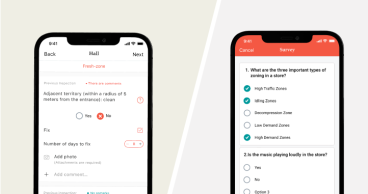Qvalon Blog article content
Imagine yourself as the head of a small retail network who is dissatisfied with the company’s performance. The obvious decision is to do an audit at your stores. You are smart and you approach the matter thoroughly: define control areas, highlight the most important business processes and make checklists.
Naturally, there are some irregularities in the course of control. You give each store manager time to fix the shortcomings in the work and look forward to improving the situation in your company. As the month goes by, you assess the situation again and see that nothing has changed.
The situation couldn’t change, because such audits don’t work.

It needs to be done at the post-audit stage
In the above example, the manager identified some shortcomings in each store manager, indicated to each of them the tasks for correction and calmed down. But he forgot about two important actions that need to be taken during the post-audit — control and analysis.
Why analyze the audit results?
Let’s mention at once that analysis is not only about combining the data obtained into a table and making diagrams based on it. Such actions are more like collecting statistics. The analysis is carried out to identify patterns or regularities and draw conclusions on how to improve the current situation. Thus, it is possible to assess the efficiency of business processes in the company, to understand whether the identified problem is local, that is, is there only one store that emerged in the entire network, or is it global?
If our manager had compared the data of all the audits, he would have noticed, for example, that there are delays in the start of sales of a new collection in every store of the network. This means that the reason for this is not the poor performance of managers, as he decided, but the bottlenecks in the business processes of the logistics service.
But this is only the current task. Audit results’ analysis can show the company direction in the formation of a new strategy, for example, to focus on increasing the efficiency of business processes of the logistics service. Decisions on the audit results’ analysis may not only be positive. Management may decide to liquidate an inefficient or outdated business process.
Why control the set tasks?
The answer to this question is obvious — to encourage employees to perform the task qualitatively. If the manager supervised the execution of the tasks, he would immediately see that no work was done for them. Then he could find out the reasons for non-compliance. Perhaps the subordinates turned out to be careless and forgot about their tasks, or maybe they just didn’t understand them or the tasks were too large to be completed in time.
With this information, the manager would be able to adjust the initial tasks or assist the managers in solving them. Therefore, it would be possible to achieve the main goal of improving the company’s performance.
How to get the desired result from the audits
We’ve already answered that question: you need to analyze the received data, set tasks based on the analysis and control their execution. All of this can be done in the QVALON system.
Our system has all the necessary tools:
- checklists for audits;
- analytical module with graphical and tabular visualization;
- module for generating and monitoring the status of tasks based on the audit results.
Let’s go back to our invented leader. If he had used QVALON, things would have been different. Immediately after the audit, he would have received data on all his stores, divided the detected flaws into global and local, and then set the corresponding tasks for correction.
Further, with the help of the system, he would be able to track the status of the tasks (in work, completed, overdue) and would immediately see that some managers have problems with executive discipline. Then our manager would find out the reasons for inaction and take measures to change the situation: helped those who couldn’t cope with the solution and replaced the ineffective employees.
Let’s say that, in our era of digitalization, the world is changing so rapidly that any technology becomes obsolete very quickly. To understand in time which of the company’s business processes needs modernization, it is necessary to carry out analysis regularly, which is possible using our system. QVALON can be your strategic navigator to guide your company’s development.
By the way, you can evaluate the capabilities of QVALON for free. Just sign up for the test access.


